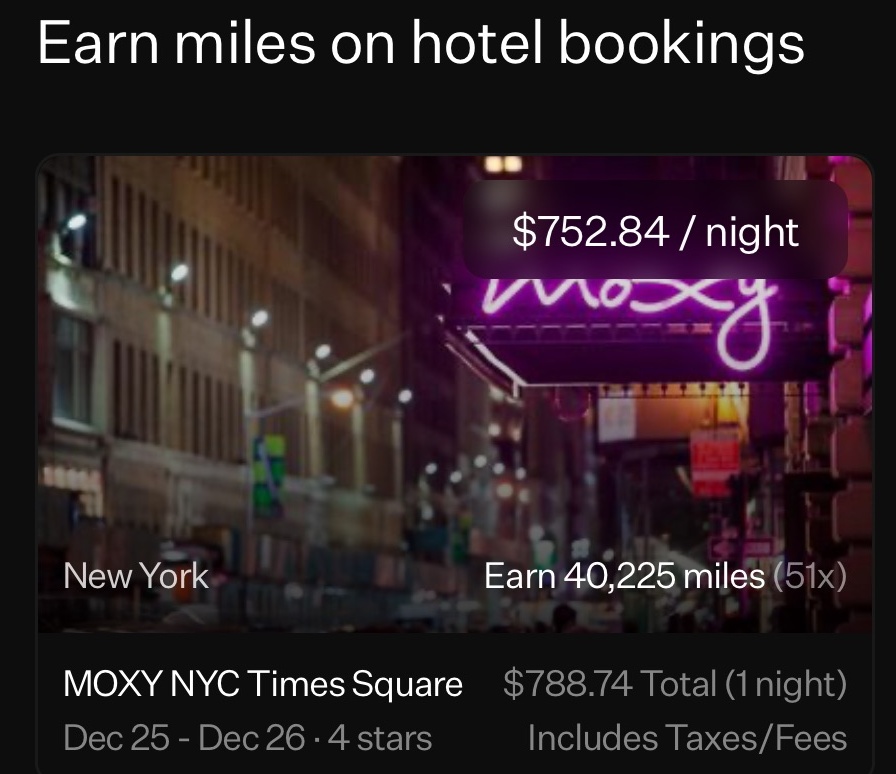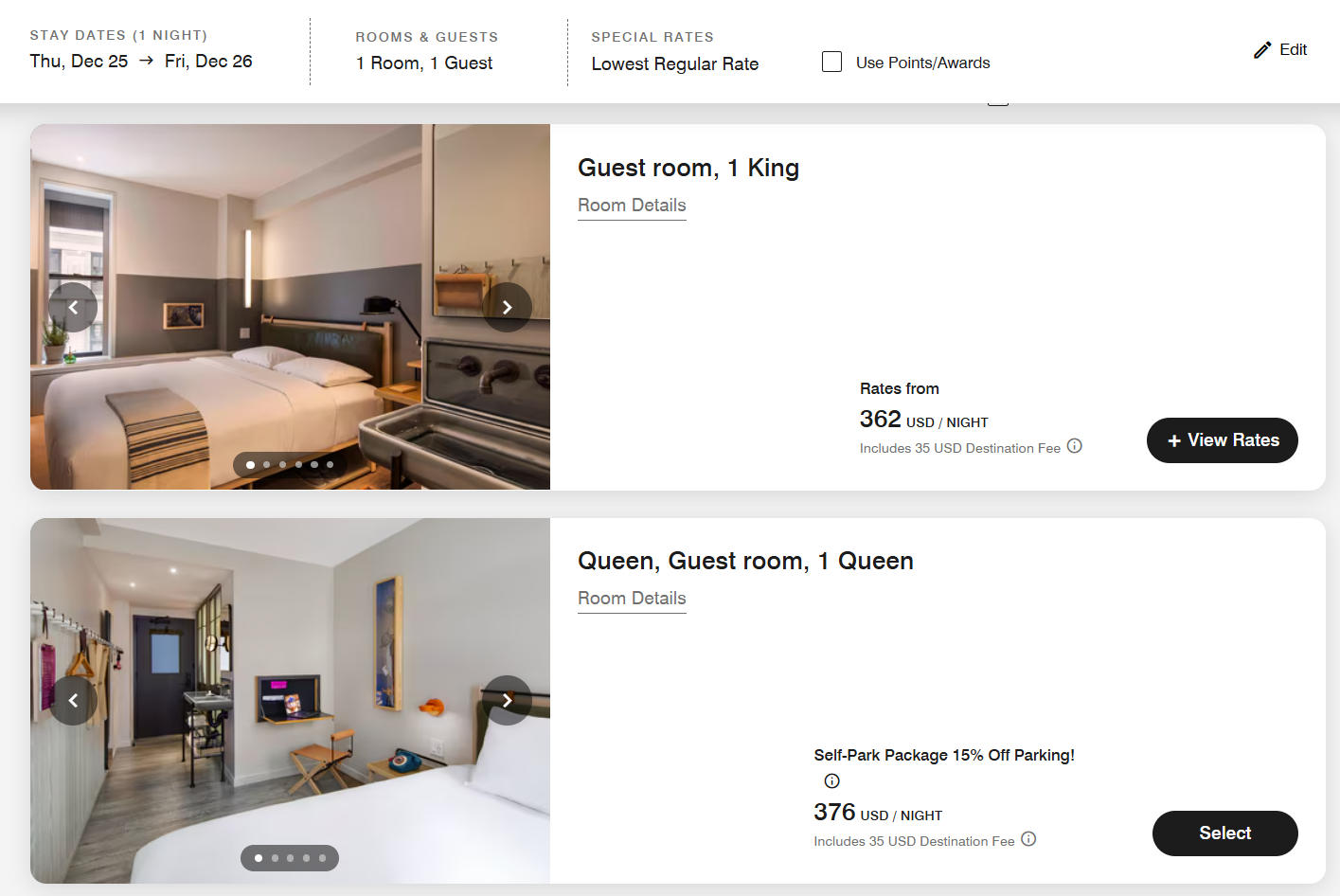I wrote this week about what looked like an amazing deal from new loyalty program Rove: 51 points per dollar booking a hotel. Since those points transfer to a variety of airlines, and can be redeemed directly for travel, surely that’s like getting a 75% rebate on the room.

I suggested that this meant it’s worth checking out Rove for your hotel bookings.
- They won’t always be this lucrative.
- And at the same time, for these super-rewarding hotels, you give up hotel loyalty program points and status credits and benefits.
- But at 75% payback that seems well worth it.
At the same time I worried that this couldn’t possibly be sustainable, because there’s no way that hotels are giving them 75% off on rooms. My read was to take the points and transfer them out, rather than building up balances in a Rove account.
The CEO and co-founder of Rove e-mailed me about that piece, tellingme in fact that he’d “[c]hecked that hotel and we actually did have a 70% margin on it, so don’t expect the ultra high multipliers to disappear anytime soon.”
Ok. Now he got me curious, because what he’s saying seemed impossible to me.
- Usually these wholesale hotel sites do get rooms at a 20% – 25% discount, and can’t undercut the chain’s own pricing. So they can rebate some of that savings to you in the form of points.
- A property might even get that discount up to 40% as part of a promotional effort to offload distressed inventory.
- But that seemed highly unlikely the week between Christmas and New Year’s in New York – Times Square – when I was seeing this. That’s a peak time, which is why the high rates we were seeing at Moxy Times Square didn’t shock me.
A 20% – 25% discount I believe, 75% I don’t, and 25% doesn’t fund 51 transferrable points per dollar. So I started looking closer. The Moxy NYC Times Square was actually pricing the room night for an undiscounted $362.

I owe you an apology. I should have done this due diligence when I first posted. Rove was charging more than twice the price as Marriott.com. Now it makes sense how they can rebate 75% – half the room rate they’re charging is a markup, on top of the assumed 20% wholesale discount they’re getting. It’s still rich rewards. They’re probably rebating almost the full economic deal to you as the customer. But this isn’t as good as it looked at first.
So I went back to Rove’s CEO, who tells me that they “never actually intentionally mark up any prices for hotels.” Instead, the higher price is something of a mistake and when that happens the system jacks up the rewards.
In the beginning, we didn’t actually have an accurate data source for hotel retail prices that we were supposed to sell at. Our suppliers were giving bad info. We just knew the retail rates they sent were on average 10% below direct, so we did a flat 10% markup (which sometimes made us cheaper and other times way more expensive).
Now, we have a really good data source (from large OTAs) on retail prices that we use, and since that day we have a 0% markup on the retail rate. The accuracy is about 90-95% at the moment, but for any rates where we are more expensive, it also means the miles earning is way more.
He argues that there are actually “a bunch of 30-50x rates that should almost exactly match the major OTA price.” And, of course, for their new hotel rates that do earn hotel loyalty program points, elite credit and benefits, those rates come “straight from the hotel” – and they’re even changing loyalty-eligible bookings “to make the hotel the merchant of record (also including the option to pay at the hotel).”
I like what Rove is doing. They’re offering a lot of value back to the customer on bookings and through their shopping portal. But I’m going to be a lot more careful comparing prices I see there with direct bookings going forward.


Same thing happens with AA Hotels all the time. Often times you’re paying a lot more for the room when they are offering a significant amount of miles. Not sure if this is just a software thing where they are looking at the highest rack price the hotel has on a room versus the price that the hotel is actually selling the room at.
The math can work out though! On the 51x deal I found the other day, with the 20% transfer bonus to avios, it was like paying an extra $600 for the room while getting $1200 worth of avios (if you value avios at 1.2cpp). That’s not a bad deal as long as you are OK with the underlying room rate itself.
I did see some 34x rates on Rove where it was generally the same rate as the hotel. But even in those cases you might be able to save going direct with the hotel using a AAA rate or whatnot.
Would be really nice if there was one site that compared 4-5 different sites for you and did the math, but for future bookings at the moment I would personally compare each of:
1. Direct through hotel
2. Agoda + Rakuten
3. AA Hotels
4. Rove
You just have to compare the lowest hotel direct rate to the portal rate + miles offered and value the miles at something to see who comes out ahead.
As a free agent business traveler, Rove has been absolutely amazing. My work doesn’t care where I stay, just that I stay under budget per night and for the year. In 11 nights I have earned 128k points while paying under $250 per night. Add in the 20% transfer bonus and that would net me over 150k points.
@Peter — I respect the extra effort you (and others) put into this, but I’m not sure I wanna even attempt Rove. So far, I typically book direct (using points at the big four, Hyatt, Hilton, IHG, Marriott), or FHR/TheEdit/Citi Travel to use those credits/discounts. However, you (and Gary) have opened my eyes to AA Hotels for the LP-earning potential. I’ve gotten burned by Agoda, but if it works for others, I’m happy for you.
Perfect for the business traveler to book a room and charge it to the company / to a client. They pay and he/she gets money back.
Obviously, that only works until they smarten up … being in pop-up hell with Amex is better than being fired for something stupid like this.
Smaller use case is meeting sign-up bonus spend. More gross spend with the same net spend
@Marc — ‘OPM’ to begin with is ideal… a bit scammy though… overcharging your company/clients… taking a cut…
Any vendor trying to get me to pay a Rove hotel bill will be told to find payment remitted where the sun does not shine.
@1990 – You’re already booking through portals for the higher value stuff to use the credits (I for one welcome our portal overlords?). I think like anything else it’s risk tolerance. If you are traveling to a large city and book through a portal, even if something happens (and notwithstanding the highlighting of the times when it goes wrong, I have to imagine that 95% of the time it goes just fine), you’re going to be able to find another hotel room. If you are traveling to, I dont know, Omaha in January, you may not want to take that risk.
Booking direct can make a lot of sense! But sometimes you end up paying $50 more through an AA Hotels, or an Agoda+Rakuten strategy, and earn miles/LPs (AA) or lots of MR (Agoda+Rakuten). Just earned 20k MR points + CC points for a weeklong $2k stay through Agoda because Rakuten was at 10x. YMMV!
@Peter — Oh, yes, thoroughly overlorded these days. And then, there’s the odd of booking directly, yet, the hotel closed… as Gary has reported on, a few times here before. Yeesh.
@Peter — Interesting update for you (Not necessary on-topic to Rove, but since you’re here…) I checked my CSR today; had a hotel charge me for a pre-paid activity; instead of it coming in at 1x UR, it was 4x, so that’s a good sign, actually (extra point/dollar as opposed to losing 2 points/dollar). Of course, it’s not as good for rental cars or cruises, but at least for charges directly with hotels, there’s still hope. Kinda changes a few things for me as I evaluate which charges get 3x via Strata Premier, Wells Autograph, BofA Premium, etc.
@1990 – sort of on topic to Rove though, as I do believe Rove codes as a hotel, so if that’s true, it’s 4x on CSR as well. With the traffic lately, I feel like rental cars should code as a hotel as well if you drive it on the BQE…
As for phantom hotels, somehow that’s so much worse than phantom award space…
Liek Chase portal, 25% back but flights are 25% more than Google Flights.
Not sure where to put this comment (how about here) – when looking on AA hotels today, saw something new, which is a bit similar to what we are seeing with Rove perhaps.
The rates are now described as “our lowest rate”, “more miles” and maximum miles.
So in this case (a stay in Delhi) the “our lowest rate” had 1,100 base miles for $114, “more miles” was 1,500 base miles for $123 (so $9 more for 400 miles/LP or 2.25cpm/lp), and then maximum miles was $151 (the 1500 base miles/lp plus the “earn 1,000 bonus miles!” that is usually there).
Point is that there’s always a bit of a dance between hotel rate and portal rate, and miles earned per portal rate. Although this is the first time I’ve seen it presented like this.
@Peter is there a reason to use Agoda over Expedia as an example? I lived in Thailand for a year and used Agoda all the time there as it seemed great for AP. Are you seeing better Rakuten X on Agoda on a normal basis?